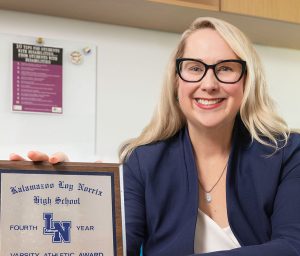This report examines the racial wealth gap for people with disabilities in the United States. While the racial wealth gap is well-documented, with the median White household having a net worth 7-10 times higher than the median Black household, the wealth gap experienced by people with disabilities remains less explored. Recent data show that households without disabilities possess, on average, 6 times the net worth of households led by a working-age person with a disability. Wealth, defined as total household assets minus total liabilities, is a comprehensive measure of economic well-being and social stratification, and it has wide implications, including for personal security and long-term health and well-being. For people with disabilities, wealth has an added dimension, as additional costs associated with living with a disability reduce the amount individuals can save over their lifetime.
Continue Reading
News
New Research Brief – Lingering Inequalities in the Information Age: An Examination of Disparities in Internet Access Among People with Disabilities
When the Americans with Disabilities Act (ADA) was enacted in 1990, the internet was in its infancy. We could not imagine how technology would change the way we interact with government services, our employer, our doctor, or the way we shop. However, the “information age” comes with structural barriers for people with disabilities. These barriers include inaccessible web sites, a lack of reliable internet connectivity, and high prices for internet service. Continue Reading
New ADALive! Episode 144: The California Project on Psychiatric Advanced Directives
Individuals in mental health crisis often cannot make informed choices for themselves. Far too often, law enforcement or first responders must quickly assess a situation and make judgements about keeping the public and the individual in crisis safe and respond quickly to address their needs for mental health treatment. One tool currently being evaluated in California is Psychiatric Advanced Directives, also known as “pads” or P-A-D-S. PADs are used to protect the legal rights of people with mental health conditions. Continue Reading
BBI welcomes Professor Robin Paul Malloy as a BBI Senior Fellow
 BBI is proud to announce the newest member of our Senior Fellows team – Professor Robin Paul Malloy, E.I. White Chair and Distinguished Professor of Law; Kauffman Professor of Entrepreneurship and Innovation; Director, Center on Property, Citizenship and Social Entrepreneurism; and Professor of Economics, Maxwell School of Citizenship and Public Affairs (by courtesy appointment). Continue Reading
BBI is proud to announce the newest member of our Senior Fellows team – Professor Robin Paul Malloy, E.I. White Chair and Distinguished Professor of Law; Kauffman Professor of Entrepreneurship and Innovation; Director, Center on Property, Citizenship and Social Entrepreneurism; and Professor of Economics, Maxwell School of Citizenship and Public Affairs (by courtesy appointment). Continue Reading
Welcome Heather DiBlasi – Assistant Project Director for the California PADs Fiscal Administration
We welcome Heather DiBlasi, who officially joined our team at BBI on July 1. As Assistant Project Director for the California PADs Fiscal Administration, Heather will handle contract management, financial analysis and reporting, and coordinate communications and deliverables between the various SU departments involved (BBI, OSP, OSA), the county sponsors, the external project director, and subcontractors. I am thrilled to have Heather in this pivotal role to help us steer through the administration of this complex, multi-sponsor project. Continue Reading
New ADALive! Episode 142: The ADA and Employment Rights for Employees with Alcohol or Substance Use Disorders
According to 2023 data from the Society for Human Resource Management (SHRM), in the U.S., 13.6 million workers or nine percent of all employed adults have current alcohol or illicit drug use disorders. In addition, 13.4 million workers, an almost equal number, report that they are in recovery from a substance use disorder. Our guest for this episode, Oce Harrison, currently oversees ADA Special Projects at the New England ADA Center, where she served as Project Director from 2001 to 2023. One of her passions is training and educating others about the rights of people with substance use disorder or alcohol use disorder. Among her many accomplishments, Oce created an ADA addiction recovery toolkit with the National Hispanic and Latino Addiction Technology Transfer Center. She also led the ADA National Network in creating the ADA, Addiction and Recovery Fact Sheet Series. Continue Reading
DIEP and EDPC RRTCs State-of-the-Science Conference Bridging Research and Practice: Advancing Disability Employment
Come explore the great research we have done for the past 5 years and engage with like minded audience members in meaningful discussion with an emphasis on looking towards the future of disability research and policy to advance employment for working age adults with disabilities. Continue Reading
Syracuse Law Professor Katherine “Kat” Macfarlane, director of the Disability Law and Policy Program (DLPP) and Burton Blatt Institute (BBI) Senior Fellow, CHAMPIONING DISABILITY RIGHTS and a beacon of resilience, advocacy and excellence.
 Burton Blatt Institute (BBI) Senior Fellow Kat Macfarlane is featured in Syracuse University News Stories. Today, as Syracuse University’s director of the Disability Law and Policy Program (DLPP), Macfarlane is shaping the next generation of disability law scholars and fostering a more inclusive environment for students and academics with disabilities. Read her entire story Continue Reading
Burton Blatt Institute (BBI) Senior Fellow Kat Macfarlane is featured in Syracuse University News Stories. Today, as Syracuse University’s director of the Disability Law and Policy Program (DLPP), Macfarlane is shaping the next generation of disability law scholars and fostering a more inclusive environment for students and academics with disabilities. Read her entire story Continue Reading
The Southeast ADA Center welcomes Stacey Kernisan as the new ADA Distance Learning and Training Coordinator
 The Southeast ADA Center – a project of the Burton Blatt Institute (BBI) at Syracuse University – welcomes Stacey Kernisan as the new ADA Distance Learning and Training Coordinator. With an extensive background in instructional design, digital learning technologies, and inclusive education, Stacey brings a forward-thinking approach to advancing the center’s mission of increasing knowledge of the Americans with Disabilities Act (ADA) and supporting equitable access. Continue Reading
The Southeast ADA Center – a project of the Burton Blatt Institute (BBI) at Syracuse University – welcomes Stacey Kernisan as the new ADA Distance Learning and Training Coordinator. With an extensive background in instructional design, digital learning technologies, and inclusive education, Stacey brings a forward-thinking approach to advancing the center’s mission of increasing knowledge of the Americans with Disabilities Act (ADA) and supporting equitable access. Continue Reading
New Publication – BBI’s Senior Director for Law and Policy Jonathan Martinis featured in an article by the ABA today. Addressing the School-to-Guardianship Pipeline
Approximately 1.5 million adults are under active guardianship or conservatorship, according to Bloomberg Law. An unknown number of these adults are young adults with disabilities, often intellectual and/or developmental disabilities (I/DD). These young adults are often funneled into guardianship by what the National Council on Disability (NCD) in its 2018 report called the “school-to-guardianship pipeline,” a phenomenon where schools are, by default, recommending to parents that they start the process of assuming guardianship over their disabled child before they become an adult. Continue Reading